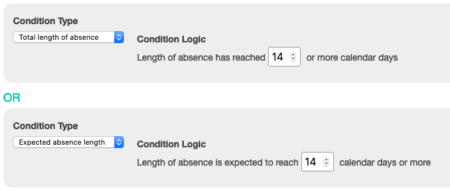Early intervention before the absence becomes long term
Most companies that have an absence policy define what is considered Long Term Absence. There are management tasks linked to the categorisation of long term absences. Commonly, managers refer long term absentees to Occupational Health and organise a welfare meeting with the employee. Organisations should start these activities as soon as the manager identifies if the absence is likely to become long term.
The early intervention mantra
In absence management, early intervention is the golden rule. We have written about the scary statistics about how the likelihood of return to work reduces as the absence continues. After just 4 weeks of absence, 20% of absentees never return to work. Yet many companies use that somewhat arbitrary 4 week marker as their first trigger to act.
Act on Day-1
As a Day-1 Absence Management company, we of course recommend that employers should not waste any time. Act on the first day of absence if the risk of the absence becoming long term is high. This could mean offering support to employees with mental health concerns from the first day. In addition, referring to Occupational Health or, better yet, physiotherapy is best practice for back problems.
Of course, you won’t always know which absences will develop into long term cases. Each absence is unique and sometimes employees present with a different reason for the absence, to mask the underlying reasons.
28 days later…
Waiting 28 days can reduce the chances of a successful return by 20%. We propose that employers should take action as soon as the employee informs them of an absence of 2 weeks or longer. Not only should we support absentees who have already been off 2 weeks but also those whose expected return date is in 2 weeks. If an employee sends in a doctor’s note that signs them off for 2 weeks, that is the ideal time for a review. Conducting reviews determines what action can be taken for the employee’s healthy recovery and their successful return in 2 weeks.

Engage absence management software now offers expected as well as actual lenghts of absence as a condition for referral or management review. And if the employee is looking to be off for a long time because they are waiting for an NHS procedure or specialist appointment, our partners over at Patient Advocate can help the employer expedite access to these NHS services – without the need for private health insurance!
